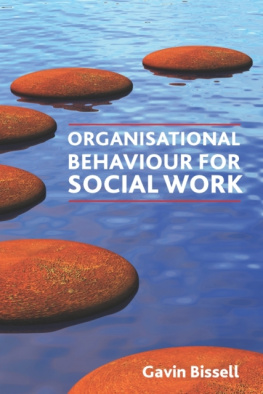Improving Personal and
Organisational Performance
in Social Work
Improving Personal and
Organisational Performance
in Social Work
JANE HOLROYD
Series Editor: Keith Brown
www.learningmatters.co.uk
Learning Matters
An imprint of SAGE Publications Ltd
1 Olivers Yard
55 City Road
London EC1Y 1SP
SAGE Publications Inc.
2455 Teller Road
Thousand Oaks, California 91320
SAGE Publications India Pvt Ltd
B 1/I 1 Mohan Cooperative Industrial Area
Mathura Road
New Delhi 110 044
SAGE Publications Asia-Pacific Pte Ltd
3 Church Street
#10-04 Samsung Hub
Singapore 049483
Editor: Luke Block
Development editor: Lauren Simpson
Production controller: Chris Marke
Project management: Swales & Willis Ltd,
Exeter, Devon
Marketing manager: Tamara Navaratnam
Cover design: Wendy Scott
Typeset by: Swales & Willis Ltd, Exeter, Devon
Printed by: MPG Books Group, Bodmin, Cornwall
2012 Jane Holroyd
First published in 2012
Apart from any fair dealing for the purposes of research or private study, or criticism or review, as permitted under the Copyright, Design and Patents Act, 1988, this publication may be reproduced, stored or transmitted in any form, or by any means, only with the prior permission in writing of the publishers, or in the case of reprographic reproduction, in accordance with the terms of licences issued by the Copyright Licensing Agency. Enquiries concerning reproduction outside these terms should be sent to the publishers.
Library of Congress Control Number: 2011945614
British Library Cataloguing in Publication Data
A catalogue record for this book is available from the British Library
ISBN 978 1 44625 674 9
ISBN 978 0 85725 995 0 (pbk)
List of figures
List of tables
List of activities
Foreword
Never before has social work needed leadership development to ensure that every individual at every level is involved. The primary focus of this text is on self-leadership and concentrates on developing exquisite communication skills and resilience. In addition, the book aims to put you in the right frame of mind to make professional judgements based upon clarity of thought and depth of leadership awareness, to ensure that you are functioning at the very best of your capabilities.
It has been expertly produced by Jane Holroyd and is adapted from an earlier version co-written with Vicky Ross. It contains a wealth of clear advice and support regarding how best to improve personal and organisational performance. Janes many years of experience are clear to see, and her expertise in leadership and management and the use of techniques such as neurolinguistic programming (NLP) provide a rich resource to all in social care or social work leadership.
It is my sincere belief that this text will benefit all who work in this field and, ultimately, their clients.
Professor Keith Brown
Series Editor
Director of Centre for Post Qualifying Social Work, Bournemouth University
About the author
Jane Holroyd has over 25 years experience in the development and delivery of services within the NHS and was awarded an MBE for her achievements and services to nursing. She worked for the Leadership Centre where she was responsible for Medical and Nurse Director Leadership programmes and associated links with Europe. She co-authored the strategy document Leadership and Management Development for Social Work and Social Care Creating Leadership Pathways of Progression and also co-authored Performance Coaching Skills for Social Work (Sage). She is a specialist in developing leadership programmes and organisational development and is a public sector coach.
Acknowledgements
This book references many individuals within the fields of behavioural psychology and neurolinguistic programming, with particular mention to Richard Bandler and John Grinder. In addition, some of the text has been adapted from the original source (Holroyd and Ross, 2011 and Holroyd and Brown, 2011), and therefore my thanks go to Vicky Ross, Keith Brown and Bournemouth University.
Introduction
This book offers a radical service-oriented leadership approach for social work and care managers and is a deliberate move away from everything that has not worked before. It is outcome focused and solution centred and is an approach to explaining human behaviour, thought and communication in enhancing personal effectiveness and, ultimately, organisational performance. It is designed to support the development of aspiring and front-line managers in social work and care. The learning outcomes for this approach will focus on what truly matters and can be assessed against the National Occupational Standards for management and leadership (see ).
Significantly, the information within is relevant, and equally useful, to health care and other public sector professionals. This book focuses on three key interrelated areas:
- self-leadership;
- resilience; and
- communication.
Fundamentally, mastering self-leadership and becoming an exquisite communicator create resourcefulness, greater self-awareness, behavioural flexibility and effectiveness which manifests itself as innate resilience. This self-leadership development centres on clear thinking (a focused mind), personal effectiveness and behavioural psychology and applies neurolinguistic programming (NLP). The American co-founders of NLP were Richard Bandler, a scientist and mathematician, and John Grinder, a linguist.
Toseys (2008) description of neurolinguistic programming refers to systemic links between an individuals internal mental experience (neuro), language (linguistic) and patterns of behaviour (programming). Walker (2004: 5) further describes the three components as:
- neuro how we use our neurology to think and feel;
- linguistic how we use language to influence others and ourselves;
- programming how we act to achieve the goals that we set.
Representing a set of practical tools and techniques for thinking, behaving effectively and, ultimately, bringing out the best in people, NLP, suggest Singh and Abraham (2008: 146), gives managers and staff a quantum leap in the efficiency to work with, understand and motivate other people, both individually and in groups.
NLP has been used with ever-growing veracity in the business world and is described as a collection of naturally occurring patterns of effective behaviour and communication that have been made explicit (Tosey and Mathison, 2009: 15). According to the Chartered Institute of Personnel and Development, NLP has become part of programmes in education, development, training in coaching, leadership development, management, communication, negotiating, cultural awareness, team building, personal advancement and many other applications to realise peoples true potential (CIPD, 2008).
The approach set out in this book, therefore, has its roots in NLP and leadership development in order to provide a critical shift in effectiveness through changing the mindsets and behaviours of leaders and front-line staff not only to enhance personal effectiveness but also to bring about sustained team and organisational performance.







